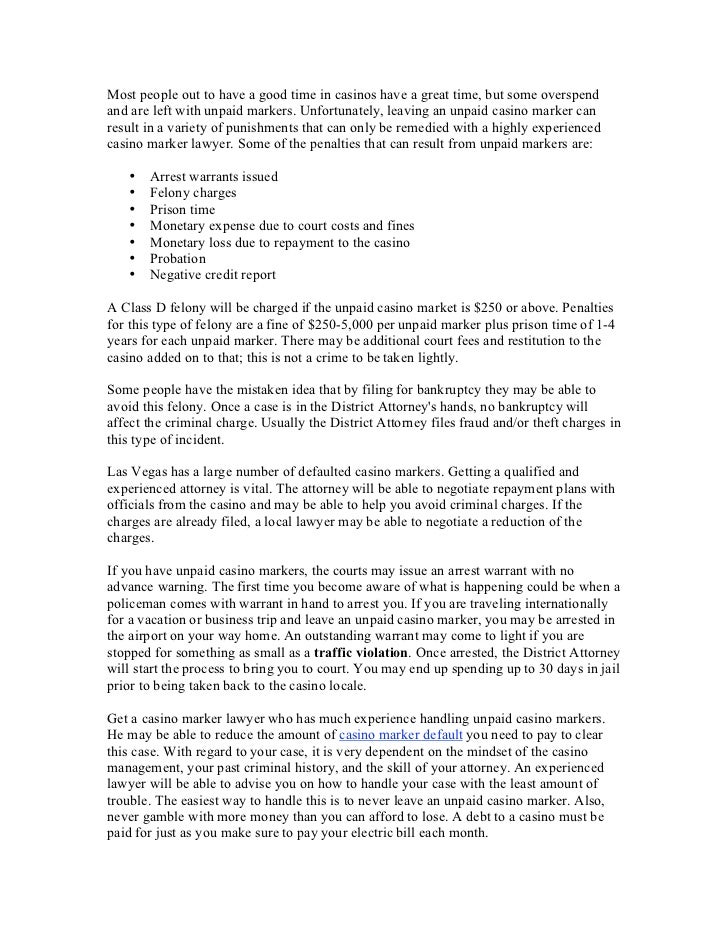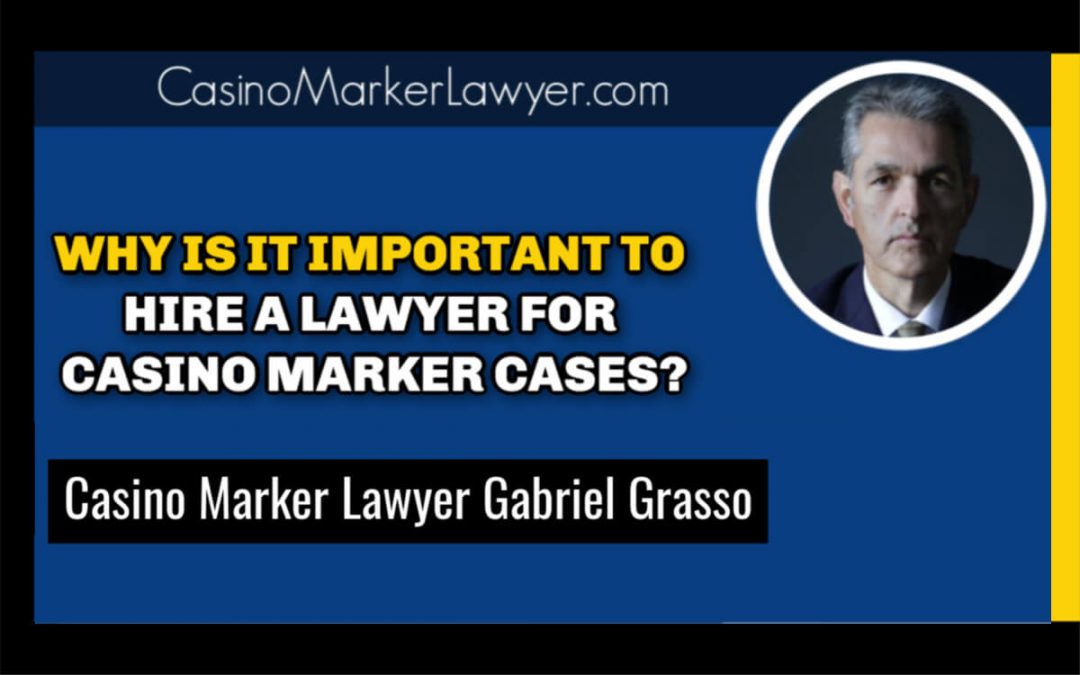Casino markers are very common in Las Vegas. Simply by filling out a form at the casino, you get instant access to a large amount money to use in the casino. It's a very tempting proposition. Be very careful: you can land in a lot of trouble if you don't know how casino markers work.
A casino marker is an interest-free line of credit that Nevada casinos offer patrons to gamble with. Patrons are expected to repay these loans soon, typically within 30 days. If you fail to pay a casino marker, the casino can (and will) come after you with criminal charges. You decided you would not get caught passing counterfeit money there because it's dark. First, everything gets filmed at a casino. Second, they check bills with those pens anyway. Third, it's a federal offense.
Casino sites that accept paypal. Casino markers are serious business in Las Vegas. If you fail to repay a casino marker within the required time — usually thirty (30) days — and ignore inquiries about repayment, you may face criminal charges in Las Vegas, as well as a civil lawsuit by the casino to recover the money owed. The criminal charge can result in a significant fine, imprisonment, and even extradition to Nevada. You can end up with a permanent felony conviction on your record that substantially interferes with your life and makes it difficult to get a job and credit.
Casino Marker Laws in Nevada
Las Vegas visitors tend to think that casino markers are like a credit card or line of credit, because that's how casinos treat them. That assumption is totally erroneous and full of risk for an unwary casino patron. Nevada law treats a casino marker like a personal check. Unpaid markers can be prosecuted under the state's bad check laws. The law assumes that you intended to defraud the casino if you do not pay the marker on time.
When your payment date passes, the casino will try to collect the money from your bank. If you don't have sufficient funds to cover the payment you owe, the casino will contact you. If you ignore the casino's communications, they will file a formal complaint. Then you will hear from the District Attorney's Office. If you ignore them, you will face felony charges, and a warrant for your arrest will be issued. You run the risk of being extradited to Nevada, especially if you attempt to travel internationally.
A single charge for an unpaid casino marker carries the possibility of a year in prison and a fine of up to $10,000. Depending on the circumstances, other felony charges may be filed at the same time.
What To Do If You Have an Unpaid Casino Marker
Casinos and criminal prosecutors in Las Vegas have a quick, tried-and-true process for following up on unpaid markers. Don't even entertain the thought that they won't catch up with you — they will. If you know you won't be able to pay a casino marker, contact an attorney at the earliest possible time. Experienced Las Vegas casino marker attorney Joseph Gersten is just a phone call or email away, so there's no excuse to wait. If you delay getting legal counsel, your situation will keep getting worse and more difficult to resolve.
In Las Vegas, the process for prosecuting unpaid markers is fast and simple. The ramifications for you and your life are anything but that.
Need Help? Contact an Experienced Las Vegas Casino Marker Attorney

Las Vegas criminal defense attorney Joseph Gersten has extensive experience with casino markers. If you are or anticipate having problems paying a Las Vegas casino marker, contact Attorney Gersten to schedule a free consultation.
When patrons of the casino get upset and make a scene, the casino will have them charged and arrested for disorderly conduct. If you get thrown out of a casino and try to return, you'll be charged with trespass. If you've been banned permanently, you'll get charged with felony criminal trespass. If you write a bad check, you will be charged with a crime. It is not uncommon for casino patrons to find that a bounced check they wrote has now resulted in an arrest warrant for them. If you fail to pay a casino marker, the casino can (and will) come after you with criminal charges. You decided you would not get caught passing counterfeit money there because it's dark. First, everything gets filmed at a casino. Second, they check bills with those pens anyway. Third, it's a federal offense. If you manage to get by number one and two, the casino will still find you.
Fake slot machine. They use face recognition software, amazing record keeping (think casino member cards), credit card and ATM records, and cameras in the parking lot (yeah jackass, they know the license plate of every car at the casino) and best of all, the State Police help them (Pennsylvania Troopers are at the casino 24 hours a day enforcing state gaming law). And in case you missed number three, the US Secret Service will also be hunting you down. At the end of the day, theft is the most common charged criminal charge made against casino patrons. While stealing chips or chip stacking scams are common charges (Ocassionally a robbery or pickpocketing crime happens, but these are actually very rare), the most common theft crime is when someone cashes out a slot machine that did not belong to them or picked up cash or a chip off the casino floor.
'Wait,' you say knowing you've done that exact thing. 'It's finders keepers, right?' Guess what? This is the biggest misconception in the law. Pennsylvania does not have a 'found money' doctrine. In Pennsylvania, lost property goes to the finder, but he must make reasonable efforts to find the true owner: 'A person who comes into control of property of another that he knows to have been lost, mislaid, or delivered under a mistake as to the nature or amount of the property or the identity of the recipient is guilty of theft if, with intent to deprive the owner thereof, he fails to take reasonable measures to restore the property to a person entitled to have it.' 18 P.S.A. § 3924. Theft of property lost, mislaid, or delivered by mistake. Cross References. Section 3924 is referred to in section 5552 of Title 42 (Judiciary and Judicial Procedure). Outside of the casino, you could take it to the police, get a receipt, hope no one ever showed up to claim it, and eventually get it to keep as your own. Maybe, you place an ad in a newspaper and wait thirty days before you claim it as your own. Technically, if you take reasonable measures, you can keep it and under 18 P.S.A. § 3924, as long as you take reasonable measures, you have a legal defense. Problem is at a casino, the only reasonable measure is to give it to the casino. As stupid as it may seem to say 'I found $1.38 on a slot machine' or 'I found a $5 chip (or even a $1 chip) on the floor'; it is your only legal choice. Whether you are at Harrah's Philadelphia or Parx or Sugarhouse or any other Pennsylvania casino, they have major 'high security' technology. Every table, every slot machine, the outside of the bathroom, the ingress and egress into and out of the casino, and virtually every public area in the casino is being filmed. To put it succinctly, the casino is going to find the true owner. Law Office of Kevin Mark Wray 200 West Front Street Media, PA 19063 (610) 566-1006 (610) 566-1002 (fax)
Casino Line Of Credit
This web posting is for general information and does not contain a full legal analysis of the matters presented. It should not be construed as legal advice or relied upon as legal opinion on any specific facts or circumstances. The invitation to contact Kevin Mark Wray, Esquire is not a solicitation to provide professional services and should not be construed as an availability to perform legal services in any jurisdiction in which Kevin Mark Wray is not licensed to practice.

Las Vegas criminal defense attorney Joseph Gersten has extensive experience with casino markers. If you are or anticipate having problems paying a Las Vegas casino marker, contact Attorney Gersten to schedule a free consultation.
When patrons of the casino get upset and make a scene, the casino will have them charged and arrested for disorderly conduct. If you get thrown out of a casino and try to return, you'll be charged with trespass. If you've been banned permanently, you'll get charged with felony criminal trespass. If you write a bad check, you will be charged with a crime. It is not uncommon for casino patrons to find that a bounced check they wrote has now resulted in an arrest warrant for them. If you fail to pay a casino marker, the casino can (and will) come after you with criminal charges. You decided you would not get caught passing counterfeit money there because it's dark. First, everything gets filmed at a casino. Second, they check bills with those pens anyway. Third, it's a federal offense. If you manage to get by number one and two, the casino will still find you.
Fake slot machine. They use face recognition software, amazing record keeping (think casino member cards), credit card and ATM records, and cameras in the parking lot (yeah jackass, they know the license plate of every car at the casino) and best of all, the State Police help them (Pennsylvania Troopers are at the casino 24 hours a day enforcing state gaming law). And in case you missed number three, the US Secret Service will also be hunting you down. At the end of the day, theft is the most common charged criminal charge made against casino patrons. While stealing chips or chip stacking scams are common charges (Ocassionally a robbery or pickpocketing crime happens, but these are actually very rare), the most common theft crime is when someone cashes out a slot machine that did not belong to them or picked up cash or a chip off the casino floor.
'Wait,' you say knowing you've done that exact thing. 'It's finders keepers, right?' Guess what? This is the biggest misconception in the law. Pennsylvania does not have a 'found money' doctrine. In Pennsylvania, lost property goes to the finder, but he must make reasonable efforts to find the true owner: 'A person who comes into control of property of another that he knows to have been lost, mislaid, or delivered under a mistake as to the nature or amount of the property or the identity of the recipient is guilty of theft if, with intent to deprive the owner thereof, he fails to take reasonable measures to restore the property to a person entitled to have it.' 18 P.S.A. § 3924. Theft of property lost, mislaid, or delivered by mistake. Cross References. Section 3924 is referred to in section 5552 of Title 42 (Judiciary and Judicial Procedure). Outside of the casino, you could take it to the police, get a receipt, hope no one ever showed up to claim it, and eventually get it to keep as your own. Maybe, you place an ad in a newspaper and wait thirty days before you claim it as your own. Technically, if you take reasonable measures, you can keep it and under 18 P.S.A. § 3924, as long as you take reasonable measures, you have a legal defense. Problem is at a casino, the only reasonable measure is to give it to the casino. As stupid as it may seem to say 'I found $1.38 on a slot machine' or 'I found a $5 chip (or even a $1 chip) on the floor'; it is your only legal choice. Whether you are at Harrah's Philadelphia or Parx or Sugarhouse or any other Pennsylvania casino, they have major 'high security' technology. Every table, every slot machine, the outside of the bathroom, the ingress and egress into and out of the casino, and virtually every public area in the casino is being filmed. To put it succinctly, the casino is going to find the true owner. Law Office of Kevin Mark Wray 200 West Front Street Media, PA 19063 (610) 566-1006 (610) 566-1002 (fax)
Casino Line Of Credit
This web posting is for general information and does not contain a full legal analysis of the matters presented. It should not be construed as legal advice or relied upon as legal opinion on any specific facts or circumstances. The invitation to contact Kevin Mark Wray, Esquire is not a solicitation to provide professional services and should not be construed as an availability to perform legal services in any jurisdiction in which Kevin Mark Wray is not licensed to practice.

